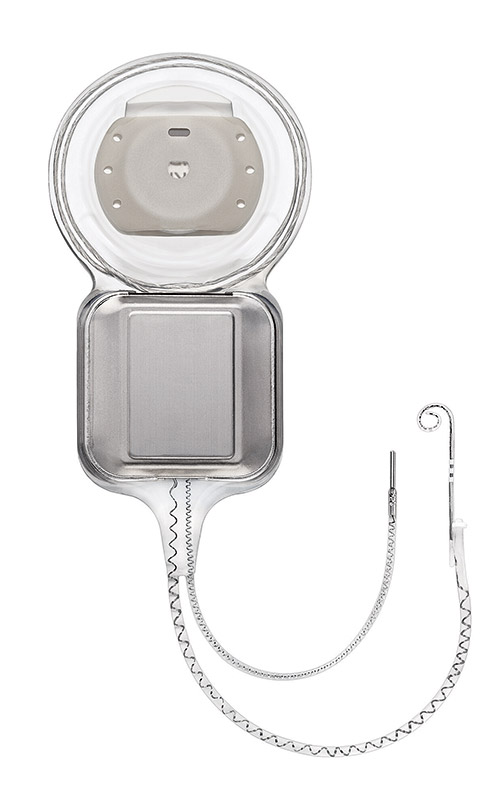Cochlear Implants Offer Hope for Patients with Severe or Profound Deafness
At University Hospitals Ear, Nose & Throat Institute’s Audiology & Cochlear Implant Center in Cleveland, Ohio, we take great pride in having one of the nation’s largest cochlear implant programs. Our knowledge and experience is found in few other hospitals. In fact, our cochlear implantation program is in the top 10 in the nation for total number of cochlear implants performed.
Your health is important. Get expert care.
Offering in-person and virtual visits. Call 216-293-7312 or schedule online.
For more information on our cochlear implantation program, please call 216-759-9193 to connect with Rachel, RN Navigator Cochlear Implant Program.
Latest Advancements in Hearing Loss Surgery
Cochlear implants benefit moderately-severely or profoundly deaf adults and children who have viable neurons in the inner ear that can respond to direct electrical stimulation. These electrical devices deliver sound to the inner ear, bypassing the damaged hair cells to deliver rich auditory impulses directly to the auditory nerves. Cochlear implants help patients hear, improve their understanding of speech and improve their speaking ability.
Since its establishment, the cochlear implant program at UH has achieved exceptional results, including:
- 100 percent full insertion rate (a measure of surgical success)
- Zero incidence of facial paralysis and infection (the most common complications of cochlear implant surgery)
Multidisciplinary Care for the Treatment of Profound Hearing Loss
More than 2 million Americans are severely or profoundly deaf, defined as 90 percent hearing loss in both ears. Hearing aid technology does not help this type of deafness; however, cochlear implants can restore hearing, even in the most severe cases.
At UH, our cochlear implant program has extensive experience in routine and complex cases in both children and adults. A board-certified neurotologist leads our highly qualified cochlear implant team. Neurotologists are doctors specializing in ear disease, ear surgery and neurological ear problems. The innovative multidisciplinary team at UH also includes:
- Audiologists and doctoral trained implant audiology specialists who lead post-surgical care and fine tune the external speech processor to best meet the patient’s unique diagnosis and progress
- Speech-language pathologists, social workers, education consultants and psychologists, as needed
- Surgeons who are fellowship trained in otology and neurotologic surgery
Minimally Invasive Techniques in Hearing Loss Surgery
Our team of specialists pioneered a minimally invasive surgical technique for cochlear implantation. The cochlear implant procedure takes just two hours, sometimes less, and can usually be done on an outpatient basis. Traditional implantation surgery can take up to four hours and is more prone to complications.
Success with cochlear implants depends on making the best decisions before, during and after surgery. At the Audiology & Cochlear Implant Center, this involves:
- Evaluating the patient to determine if an implant is the right course of action
- Selecting the right type of implant to suit the patient’s specialized needs
- Programming, tuning, training and education after surgery
- Teaching patients with prelingual deafness to speak for the first time
- Providing auditory training and aural rehabilitation to post lingually deafened patients to teach these patients how to use the auditory signal
Cochlear Implant Procedure Using Local Anesthesia
In the U.S., the majority of cochlear implant procedures are performed under general anesthesia. However, there are a few select cochlear implant centers in the country that now offer the procedure using light sedation and local anesthesia instead of general anesthesia. University Hospitals is the only center in the region performing cochlear implant surgery in this way.
Certain patients can benefit from the use of local anesthesia over general anesthesia. This includes elderly patients who are not as tolerant of general anesthesia as younger patients and who may be at risk for cognitive decline related to general anesthesia. Additionally, patients with certain heart and pulmonary issues may benefit from the procedure being performed under local anesthesia.
The cochlear implant procedure using local anesthesia and sedation is a faster procedure compared to general anesthesia and can usually be completed in 60 minutes or less.
Your surgeon will talk to you about all of your options for cochlear implant surgery, and together you will decide which method will work best for your individual circumstances.
Bone Conduction Implants as a Treatment Option for Hearing Loss
In addition to implants directed to the inner ear, experts at UH Ear, Nose & Throat Institute’s Audiology & Cochlear Implant Center also use the latest technology with bone conduction implants. The Cochlear™ Baha® System allows our surgeons to connect patients to the wonderful world of sound in cases where the inner or middle ear function is blocked or too severely damaged in one ear. Our specialists can use a patient’s bone to conduct sound, transferring it to the hearing ear with the placement of the bone conduction implant. This innovative system provides a clinically proven and tested solution for treating:
- Conductive hearing loss
- Mixed hearing loss
- Single-sided deafness
What is a Cochlear Implant and How Does it Work?

Cochlear Implants are benefiting thousands of severely or profoundly deaf adults and children who have viable neurons in the inner ear that can respond to direct electrical stimulation. These electrical devices deliver sound to the inner ear, bypassing the damaged hair cells to deliver rich auditory impulses directly to the auditory nerves. Cochlear implants help patients hear, improve their understanding of speech and improve their speaking ability.
The cochlear implant has three components:
Headpiece – Worn externally behind the ear like a hearing aid, the headpiece has a microphone where sound enters and travels down a cable to a speech processor.
Speech Processor – A small box worn in a pocket or on a belt changes the sound from the microphone into an electrical code and sends the code back up into the headpiece. Most patients now choose to wear a miniature speech processor behind the ear like a hearing aid.
Implantable Receiver – Surgically placed within the cochlea, the implantable receiver takes the electrical code and sends it through tiny wires to the inner ear to directly stimulate the hearing nerve fibers.
The brain adapts to give the person what sounds like almost normal speech. While the result does not fully reproduce normal sound, the device filters out background noise and is good for person-to-person conversation.
The three major types of cochlear implants are available—the Cochlear America’s, Advanced Bionics, and Med-El devices. The surgical procedure generally lasts about 2 hours. The team helps each patients choose the most appropriate device.
For more information, please call 216-759-9193 to connect with Rachel, RN Navigator Cochlear Implant Program.
Make an Appointment
Your health is important. Get expert care.
Offering in-person and virtual visits. Call 216-293-7312 or schedule online today.
One of the Best for ENT Care

UH Cleveland Medical Center was ranked by U.S. News as one of the 50 Best Hospitals in the Nation for ENT Care.


